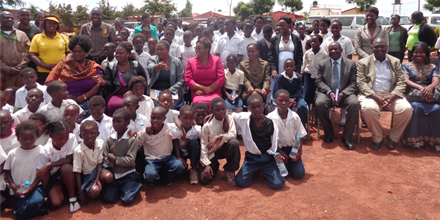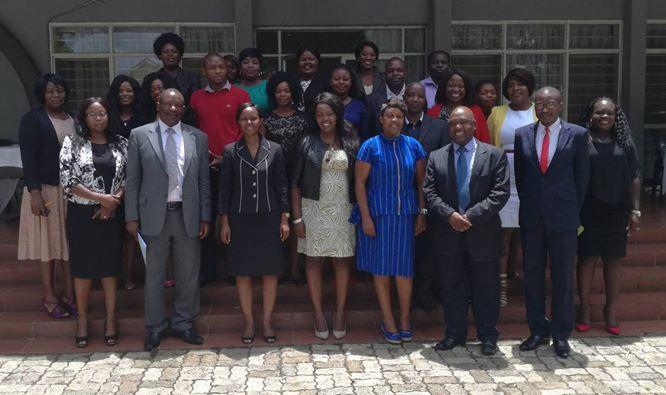Drug Enforcement Commission arrests 5, 352 persons in 2019 compared to 5,241 in 2018
Notice: Undefined index: catFilterList in /home/zambi/public_html/wp-content/plugins/wp-likes/api.php on line 243
PRESS STATEMENT
Lusaka, Saturday 14th March, 2020 – The Drug Enforcement Commission recorded a 2.12 percentage annual increase in the number of arrests made in 2019 from a total of 5, 352 persons compared to 5,241 arrested in 2018.
Of the total number of people arrested, 294 were female while 5, 058 were male. Juveniles between the age of 11 and 17 accounted for 370 persons.
Further, 3, 541 drug related cases were concluded at court as at 31st December, 2019 which included 2, 945 convictions and 114 acquittals. The remaining 482 were concluded on various outcomes.

Drug Enforcement Commission (DEC) Director General Alita Mbahwe – Picture by Tenson Mkhala News Diggers Zambia
On overall, a total of 135.08 tonnes of cannabis was seized countrywide wide with Muchinga Province recording the highest at 89.9 tonnes followed by Eastern Province with 10.5 tonnes. Other drugs seized include 11.64kg of heroin, 486.08g of cocaine and 1.42 tonnes of miraa.
Further, the Commission identified a total of 121 Drug Trafficking Organisations (DTOs) and groups of notorious traffickers out of which 97 were dismantled.
Money laundering and counterfeit notes
The Anti-Money Laundering Investigations Unit (AMLIU), received a total of two hundred and fifty-eight (258) reports on different predicate offences to money laundering from the public and private sectors including individuals, countrywide. Out of the two hundred and fifty-eight (258) cases received, six (06) were from the Financial Intelligence Centre (FIC) of which two (02) resulted in arrests and one (01) was closed on false on inquiry. The other three (03) are still under investigations. The total amounts involved in all the cases received during 2019 were ZMW153, 540, 081.71 and US$9, 567, 642.29.

Children reached by DEC
Out of the two hundred fifty eight (258) cases received in 2019, the Unit commenced investigations on two hundred and fifty two (252) of them translating into 98% of cases commenced for investigations against the 75 per cent set target in the DEC Strategic Plan of cases investigated annually. Investigations on the other six (06) cases could not be commenced as they were received at the close of the year. As a result of the commenced investigations, a number of properties reasonably suspected to be proceeds and instrumentalities of crime were seized. Items seized included: twenty-eight (28) real estate properties (land and buildings), thirty-one (31) motor vehicles, cash amounts of ZMW7, 040, 025.64 and US$551, 200.0 and ninety-one (91) other various properties which included household goods and office furniture. Further, the Unit was in the same year, running with investigations of eight hundred and fourteen (814) cases reported in 2018 and previous years.

Zambia’s Drug Enforcement Commission Public Relations Officer (PRO) Theresa Katongo
Investigations were concluded on a total of one hundred and thirty (130) cases in the year 2019, leading to the arrest of one hundred and thirty (130) persons in seventy-two (72) cases for money laundering related offences. The total amounts involved in the seventy-two (72) cases were ZMW37, 314, 142.59); and US$466, 990.00. Forty-seven cases were closed under other headings of which: twenty-nine (29) were closed on false on inquiry and nine (09) were withdrawn by the complainants, while the other nine (09) due to insufficient evidence. Further, eleven (11) cases received during 2019, were referred to other institutions for investigations, of which five (05) were referred to Anti-Corruption Commission (ACC), three (03) to Zambia Police Service (ZPS) and the other three (03), to Zambia Revenue Authority (ZRA).
In respect of cases from the current and previous years concluded in court, the Commission recorded twenty-one (21) convictions involving thirty one (31) persons, and forfeiture of eleven (11) motor vehicles.
Meanwhile, the Commission seized a total of ZMW 1, 229, 774.00 and USD 337, 900.00 of counterfeit notes in 2019. Other counterfeit notes seized include ZAR 1,100.00
The trends in the year under review indicate an increase in cases of counterfeiting United States dollars which recorded 942.9 percentage increase from 2018 and a reduction of 58.49 percent of the Zambian kwacha while the Commission saw the emergence of counterfeiting South African Rands.
Further, predicate criminal offences included theft by servant, cybercrime frauds, fraudulent false accounting, forgery and uttering of false documents, corruption and abuse of authority of office. Money laundering included self and third-party laundering involving the use of bank services and products, purchase and construction of real estate, motor vehicles and household goods registered in third parties.

Kamufisa Manchishi
Deputy Public Relations Officer
Drug Enforcement Commission
Drug demand reduction and counselling
The Commission through the National Education Campaign Division (NECD) conducted a total of 2, 207 awareness activities on money laundering activities, illicit drug trafficking, drug abuse and cultivation of cannabis. A total of 644,940 people were sensitised through institutions of learning, community and workplace programmes as part of the drug demand reduction strategy.
Further, the Commission attended to 797 clients under the counselling and rehabilitation programme as compared to 759 in 2018, representing a 5.28 percentage increase.
The clients attended to in the counselling and rehabilitation programme were aged between 12 and 45 years of which 471 were pupils with the primary drugs or substances of abuse being cannabis, alcohol, tobacco, codeine, cocaine, heroin and diazepam.
As at 31st December, 2019, the Commission had attended to a total of 85 clients under the pre-trial Juvenile Diversion Project being implemented as a pilot project under the auspices of the Ministry of Community Development and Social Services in Lusaka, Central and Copperbelt provinces.
The project which is supported by the United Nations International Children’s Emergency Fund (UNICEF) and Coram International aims at diverting juvenile offenders from the Criminal Justice System by facilitating restorative measures such as psycho-social counselling and life-skills development as vehicles for positive behavioural change.

Zambia’s Drug Enforcement Commission (DEC) Public Relations Officer (PRO) Theresa Katongo

Jeromi Fleischer Community School Director Fay Kuwani Yalenga
Overview
The Commission continues to fulfil its mandate of prevention and control of illegal cultivation, production, trafficking, abuse of narcotic and psychotropic drugs as well as prohibition and prevention of money laundering activities.
In this regard, the Commission has continued to implement a Strategic Plan for the period 2018-2021 under the theme ‘a smart and value-centred Drug Enforcement Commission’ with a view to improve on the Institution’s operations and procedures.
Further, the year 2020 has been dabbed under the theme ‘Service Excellence in a Dynamic Environment’ which reaffirms our commitment to promote service excellence as espoused in our Service Delivery Charter.
We wish to thank various stakeholders that contributed to our operations in 2019 such as defence and security wings, government departments, health institutions, the media and other non-governmental stakeholders alike.

Zambia’s Drug Enforcement Commission (DEC)
It is our hope that members of the public will continue to support the fight against money laundering, drugs and substance abuse in order to realise a prosperous Zambia in which no one is left behind as envisioned in the Seventh National Development Plan (7NDP), among other national developmental programmes.
Theresa Katongo
Public Relations Officer
DRUG ENFORCEMENT COMMISSION




















